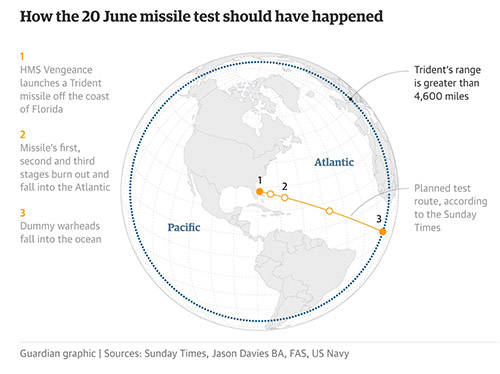You are here
HMS Vengeance : serious Trident missile malfunction
Downing Street has been accused of covering up a Trident missile malfunction weeks before a crucial Commons vote on the future of the submarine-based missile system.
A Trident II D5 missile test ended in failure after it was launched from the British submarine HMS Vengeance off the coast of Florida in June 2016. The weapon is 13 metres long, weighs 60 tonnes and can carry nuclear warheads with up to eight times the destructive capacity of the bombs that hit Hiroshima and Nagasaki in the second world war. Trident missile can hit a target 4,000 nautical miles away and be accurate to within a few metres.
The problem is that when HMS Vengeance, one of the UK’s four nuclear submarines, test-fired the missile off the coast of Florida, the missile was not out by a few metres but several thousand miles. It had been targeted at the southern Atlantic off the coast of west Africa. Instead, it was heading in the opposite direction, over the US.
The four previous UK tests – in 2000, 2005, 2009 and 2012 – were successful, it was the only firing test of a British nuclear missile in four years and raises serious questions about the reliability and safety of the weapons system. But the error was hushed up. The cause of the failure remains top secret, but quotes a senior naval source saying the missile, which was unarmed for the test, suffered an in-flight malfunction after launch. According to defence sources, the missile did not veer off in the wrong direction because it was faulty but because the information relayed to it was faulty. This explanation is not reassuring.
It was reportedly intended to be fired 5,600 miles to a sea target off the west coast of Africa but may have veered off towards America instead. There was a major panic at the highest level of government and the military after the first test of our nuclear deterrent in four years ended in disastrous failure. In July, MPs voted by 472 to 117 to back the renewal of Britain's Trident nuclear deterrence. The overwhelming vote supported the Government's plans to spend up to £40 billion on four new Successor-class submarines.
Some analysts say the fact that UK tests are infrequent is not important because the US tests much more frequently and both share the underlying technology. There are over 150 tests over almost 30 years, with a sub-3% failure rate, and well under 1% since British submarines began carrying the missiles.

Source
http://www.independent.co.uk/
http://www.thetimes.co.uk/
https://www.theguardian.com
- András István Türke's blog
- Log in to post comments







